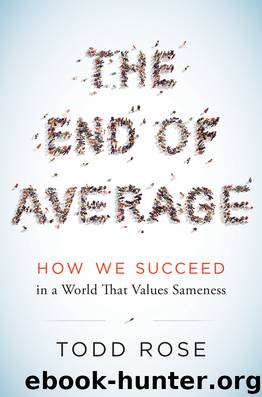The End of Average by Todd Rose

Author:Todd Rose
Language: eng
Format: epub, mobi
Publisher: HarperCollins Canada
Published: 2015-12-04T16:00:00+00:00
WEBS OF DEVELOPMENT
It’s not too hard to believe that everyone develops at a different pace, or even that we each progress at different paces in different domains. What can be much harder to accept is the second assertion of the pathways principle: there are no universally fixed sequences in human development—no set of stages everyone must pass through to grow, learn, or achieve goals. The idea of normative stages gained widespread public support in the early twentieth century because of the work of a pioneer in infant studies, an American psychologist and pediatrician named Arnold Gesell.37
Gesell believed that evolution designed the human brain to unfold in a certain sequence determined by biological maturation, so that the mind had to learn and adjust to specific things about the world before it could proceed to more advanced stages, with each new stage serving as an essential foundation for the next.38 Gesell was the first scientist to track the development of large numbers of infants and the first to use the average of their development to describe fixed milestones that he believed represented the normal progression of a typical child.39
Gesell found average-based stages everywhere he looked: for example, he identified 22 stages in the development of crawling, including “lifting the head and chest off the ground, pivoting in circles, pulling forward with the abdomen dragging along the ground, hopping forward with the belly alternately on and off the ground, rhythmical rocking on hands and knees, crawling on hands and knees, creeping on hands and feet.”40 He claimed to have identified 58 stages of behavior when playing with a pellet (twenty-eight-week-old toddlers place an open hand over a pellet, according to Gesell, while forty-four-week-old toddlers hold it tightly) and 53 stages of rattle-grasping behavior.41 He even coined the term “Terrible Twos” and the phrase “he’s just going through a stage.”42
Gesell set up a laboratory at Yale University where he tested babies and gave them “Gesell scores” indicating how their physical and mental development compared to the norm.43 If a child failed to progress through the proper sequence of stages, parents were often told (or left to assume) that something might be wrong with their child.44 These “Gesell scores” were also used as a basis for adoption: Gesell believed that he could improve the success of adoptions by matching smart babies with smart parents, and average babies with average parents.45 Many medical organizations, including the American Pediatrics Society, endorsed Gesell’s framework at the time,46 and today his ideas still form the basis for the “normal” ages for developmental milestones used in many pediatric guides and popular parenting books.47
Gesell and nearly a century of stage theorists have viewed development as a kind of immutable ladder, believing that from the moment of birth, we are each predestined to climb this same ladder rung by rung.48 But starting in the early 1980s, some researchers began to notice that many of the children in their studies did not conform to the prescribed sequences that were thought to be universal.
Download
This site does not store any files on its server. We only index and link to content provided by other sites. Please contact the content providers to delete copyright contents if any and email us, we'll remove relevant links or contents immediately.
| Biomathematics | Differential Equations |
| Game Theory | Graph Theory |
| Linear Programming | Probability & Statistics |
| Statistics | Stochastic Modeling |
| Vector Analysis |
Modelling of Convective Heat and Mass Transfer in Rotating Flows by Igor V. Shevchuk(6429)
Weapons of Math Destruction by Cathy O'Neil(6260)
Factfulness: Ten Reasons We're Wrong About the World – and Why Things Are Better Than You Think by Hans Rosling(4729)
A Mind For Numbers: How to Excel at Math and Science (Even If You Flunked Algebra) by Barbara Oakley(3293)
Descartes' Error by Antonio Damasio(3270)
Factfulness_Ten Reasons We're Wrong About the World_and Why Things Are Better Than You Think by Hans Rosling(3230)
TCP IP by Todd Lammle(3177)
Fooled by Randomness: The Hidden Role of Chance in Life and in the Markets by Nassim Nicholas Taleb(3104)
Applied Predictive Modeling by Max Kuhn & Kjell Johnson(3063)
The Tyranny of Metrics by Jerry Z. Muller(3056)
The Book of Numbers by Peter Bentley(2960)
The Great Unknown by Marcus du Sautoy(2687)
Once Upon an Algorithm by Martin Erwig(2640)
Easy Algebra Step-by-Step by Sandra Luna McCune(2625)
Lady Luck by Kristen Ashley(2574)
Police Exams Prep 2018-2019 by Kaplan Test Prep(2540)
Practical Guide To Principal Component Methods in R (Multivariate Analysis Book 2) by Alboukadel Kassambara(2535)
All Things Reconsidered by Bill Thompson III(2388)
Linear Time-Invariant Systems, Behaviors and Modules by Ulrich Oberst & Martin Scheicher & Ingrid Scheicher(2361)
